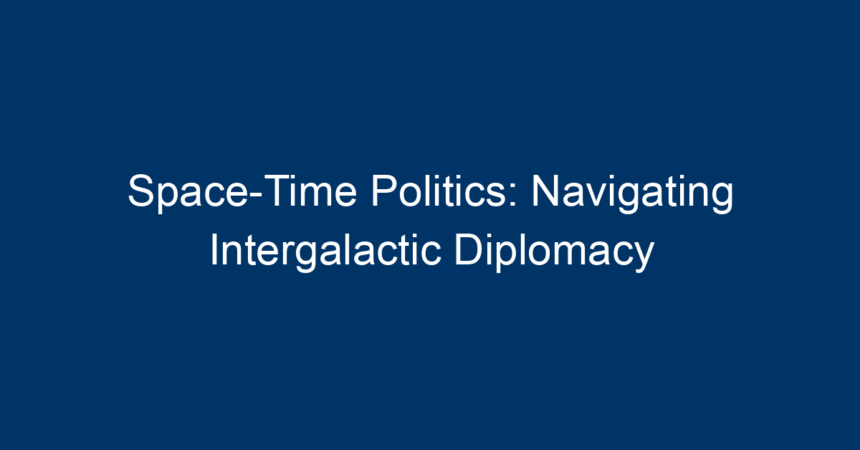In an era where science fiction often influences our dreams of the future, the concept of space-time politics is fast becoming a relevant topic in conversations about intergalactic diplomacy. As we inch closer to the technological advancements that might one day allow us to traverse the stars, understanding the dynamics of space-time politics is crucial. This article explores the implications, challenges, and potential frameworks for intergalactic diplomacy, serving as a guide for how humanity may navigate the uncharted waters of diplomatic relations beyond our planet.
Understanding Space-Time Politics
The Nature of Space-Time Politics
Space-time politics refers to the interplay between geographical and temporal factors in shaping political relations. Unlike traditional politics, which is often bound by national borders and time zones, space-time politics operates on a cosmic scale. It considers how various civilizations across different timelines may interact, negotiate, and coexist.
Key Concepts
- Astropolitics: The study of political behavior in outer space, focusing on how states, corporations, and other entities vie for control over extraterrestrial resources and territories.
- Temporal Diplomacy: The hypothetical possibility of communicating or negotiating with civilizations that may exist in different timelines. This concept invites questions about causality and the consequences of intervention across time.
The Importance of Intergalactic Diplomacy
The Need for Governance
As scientific advancements lead us closer to space exploration and potential colonization, the governance of outer space becomes paramount. Treaties like the Outer Space Treaty of 1967 have laid the groundwork, yet they are outdated. The rapid pace of technology demands a new framework that addresses:
- Resource Allocation: How will resources like water, minerals, and energy be shared among various interstellar players?
- Environmental Protection: What measures will be in place to protect celestial bodies from degradation?
- Conflict Resolution: How will disputes be settled in a universe where traditional law may not apply?
The Risks of Ignoring Space-Time Politics
Neglecting the complexities of space-time politics could result in conflicts that mirror historical territorial disputes on Earth. A failure to engage in proactive intergalactic diplomacy may lead to:
- Resource Wars: Just as nations have fought over oil and minerals, space could become a battleground for precious cosmic resources.
- Environmental Catastrophes: Unregulated exploitation of celestial bodies could lead to devastating consequences for both the cosmos and Earth.
Challenges in Space-Time Politics
Cultural Misunderstandings
One of the primary challenges in space-time politics is the vast cultural differences between civilizations. For example:
- Communication Barriers: Just as language differences present challenges today, inter-species communication could be fraught with misunderstandings.
- Diverse Value Systems: What might be considered a humanitarian act in one culture could be seen as an act of aggression in another.
Technological Disparity
Technological advancements will likely vary widely between civilizations. This disparity could lead to power imbalances that complicate diplomatic relations:
- Technological Subjugation: A technologically advanced civilization could dominate another, making equitable negotiations difficult.
- Inequitable Resource Access: The ability to utilize space-time technology efficiently could lead to a monopolization of resources.
Frameworks for Intergalactic Diplomacy
Multilateral Treaties
The establishment of multilateral treaties could serve as a foundational framework for intergalactic diplomacy. Such treaties would require:
- Inclusive Participation: Ensuring that all participating civilizations have a voice.
- Regular Updates: Treaties should be dynamic, evolving to meet the needs of all parties involved.
Intergalactic Organizations
The creation of organizations akin to a cosmic United Nations could facilitate communication and collaboration:
- Crisis Management: These organizations could serve as mediators during disputes, providing neutral ground for negotiations.
- Resource Sharing: They could oversee the distribution and management of resources, ensuring equitable access.
Ethical Guidelines
Developing a code of ethics regarding intergalactic interactions is crucial:
- Respect for Sovereignty: Each civilization should be recognized as a sovereign entity.
- Promotion of Peaceful Coexistence: Encouraging dialogue over aggression will pave the path to harmonious relations.
Case Studies in Space-Time Politics
The Space Race: A Historical Model
The Cold War-era Space Race serves as a historical example that can inform our understanding of future intergalactic politics.
- Competition vs. Collaboration: While it fueled advancements and international cooperation, it also created significant tensions that could resonate in future space endeavors.
- Technological progress: The race accelerated innovations that may prove essential in future explorations, yet it also illustrated the importance of collaborations over conflicts.
Modern-Day Initiatives
Organizations like SpaceX and Blue Origin are taking steps toward commercializing space travel. Their efforts could lead to economic partnerships or tensions similar to those seen in earthly politics.
Actionable Insights for Navigating Space-Time Politics
Embrace Collaboration
Engaging in multilateral discussions early can lay a foundation for cooperative relationships. Stakeholders should start forming alliances now, preparing for the day when we make contact with other civilizations.
Invest in Education
To understand the complexities of space-time politics, education is key. Knowledge-sharing platforms and interdisciplinary studies will prepare future leaders to navigate these waters deftly.
Develop Space Governance Protocols
Establishing guidelines for space exploration, resource extraction, and environmental protection will help mitigate potential conflicts. By creating these protocols now, we can form ethical frameworks that future generations can expand upon.
Cultivate Cultural Awareness
Understanding diverse cultures will promote empathy and mutual respect, which will be crucial for successful diplomacy. Initiatives that promote intercultural dialogue can build the groundwork for peaceful intergalactic relations.
Conclusion
As we embark on this intriguing journey into the cosmos, understanding space-time politics becomes increasingly vital. By embracing intergalactic diplomacy, we can navigate the complexities of resources, cultural differences, and technological disparities. While we may be far from encountering extraterrestrial civilizations, the groundwork we lay now will shape the diplomatic tapestry of our future among the stars.
The call for proactive engagement in space-time politics is now more crucial than ever, ensuring that our exploration of the universe is rooted in cooperation, ethical guidelines, and a shared vision for peace. Only then can we hope to foster a future where humanity thrives alongside other civilizations in the vast expanse of space.




